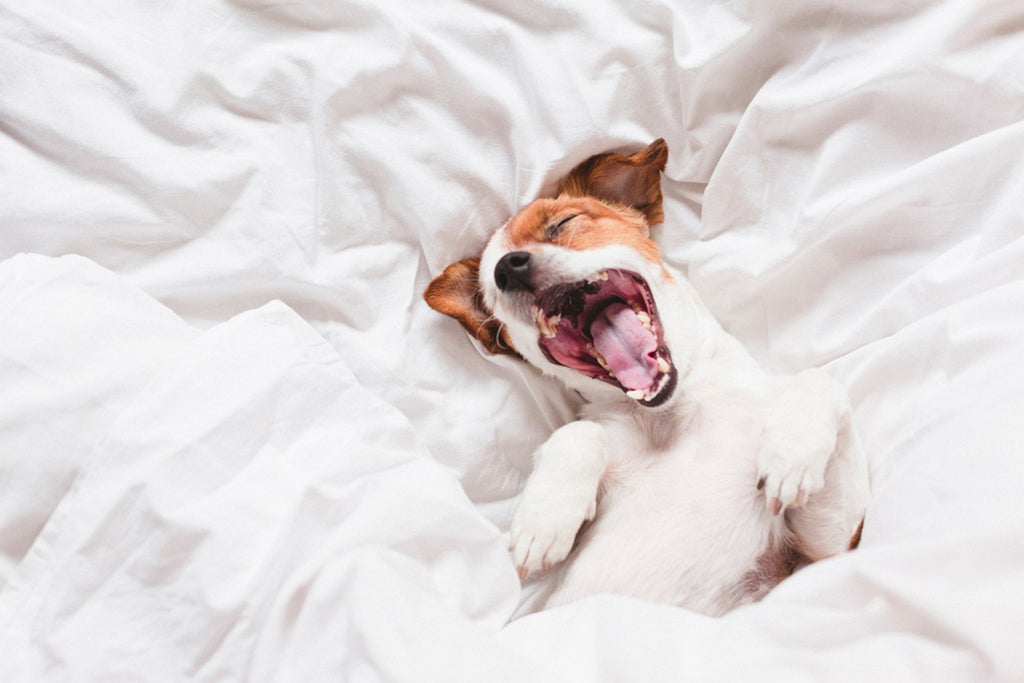7 Min Read
Do Dogs Dream?
Key takeaway

Why pet owners are switching to online vet care with Dutch
-
Prescriptions delivered free to you
-
Fast access to Licensed Vets over video
-
Unlimited video visits and follow-ups
If you've ever noticed your dog twitching or making yipping sounds in their sleep, you might wonder, "Do dogs dream?" Research suggests that, like you, your dog dreams. Dogs go through similar stages of sleep as people. They enter rapid eye movement (REM) sleep, the sleep stage in which dreaming occurs.1 Therefore, if you notice your dog twitching its legs or yipping, it might be dreaming that they're running, playing, or chasing a squirrel in the yard.
So, do dogs dream? Research proves that they do. According to a 2001 study by researchers at MIT, animals, including rats, dream.2 This study measured the brain activity of rats running through a maze and sleeping, concluding that rats were likely dreaming about the same maze they ran. Therefore, it's highly likely that animals have complex dreams just like humans. So the next time your dog starts kicking their legs, they're likely dreaming about something exciting.

Dog Sleep Stages
Dog sleep is similar to human sleep, and not just because they can snore. Now that you have the answer to your question, "Do dogs have dreams?" you might wonder how it's possible since they're so different from us.
However, there are similarities in the way sleep is regulated, which indicates common underlying mechanisms.3 Do dogs dream like humans? It's highly possible, and the answer to why can be found in our sleep cycles.
Non-REM Sleep
As you already know, there are four stages of sleep for humans, including non-REM and REM sleep. Dogs experience the same cycles as humans, but they're shorter and more frequent.4
Non-REM sleep has three stages in which the body begins slowing down. The heartbeat, eye movements, brain waves, and breathing slow more and more throughout each stage as motor movements diminish.
During stage 3, the heartbeat, muscle activity, breathing, and brain waves are at their slowest, and dogs enter deep sleep. Your dog will be less receptive to sounds, light, and movement.

REM Sleep
Do dogs have dreams? Thanks to REM sleep, they do. After deep sleep, dogs enter REM sleep. REM sleep is the fourth sleep stage and is associated with dreaming. During REM sleep, the eyes move rapidly, the heart rate speeds up, and breathing may become irregular. However, unlike humans, the length of dog sleep cycles varies.
A 1977 study of the electrographic patterns of six pointer dogs in a lab setting identified two states of sleep: slow-wave and REM, and wakefulness: alert and drowsy. The recording period concluded that REM sleep makes up about 12% of a dog's overall life, with them being alert about 44% of the time.5
Additionally, dog researcher Dr. Stanley Coren found that larger dogs have longer sleep cycles and experience dreams every 90 minutes, while smaller dogs have shorter dreams but dream more frequently.3
Additionally, based on the information the MIT researchers gathered about the rats, they could determine which maze the rats were dreaming about, demonstrating that, like us, animals have complex dreams that help them process events and form memories.4
When your dog enters REM sleep and begins dreaming, it might start twitching, moving its eyes, performing a running motion while lying down, or wagging their tails. Many dogs also make sounds, such as heavy breathing or yipping.
When dogs twitch in their sleep, it's called myoclonus, or involuntary muscle movements.6 These muscle jerks are common in humans and dogs and most commonly occur during REM sleep when vivid dreaming occurs. Therefore, if your dog makes small movements or sounds in their sleep, it's usually nothing to be concerned about.
What Do Dogs Dream About?
Researchers believe that dogs dream about the same things as humans. Sleep helps process events and form memories in humans, so the same is likely true for dogs. When the researchers from MIT measured the brain waves of rats asleep, they found that they were the same as when the rats were in the maze, concluding that rats and other mammals can dream about recent events.
Sleep is essential for memory consolidation in humans, so it's reasonable to believe the same is true for dogs. For example, your dog might nap after a training session and dream about the tricks to help them learn.
Therefore, your dog's dreams likely consist of memories from their daily lives in fragments.4 In other words, your dog's dreams are based on their life experiences, including going on walks, training, and enjoying time spent with you.
However, since dogs can have good dreams, you might wonder, "Do dogs have bad dreams?" Unfortunately, dogs can have nightmares because their dreams are based on fragments of real life.
Dogs can recall events in their dreams to help them form memories and reflect on their day, so it's essential to help your dog build good, happy memories to prevent bad dreams. Researchers believe they're close to determining why dogs dream about certain things by evaluating the content of the dreaming state to understand why certain events are replayed.7 This research could help us understand why dogs have bad dreams or dream about certain memories instead of others.
Research on dog dreams has also given us more insight into our canine companions' thought processes. Most of us like to believe our dogs live in the moment and don't think about the past, but that isn't true. If dogs can have nightmares based on past experiences, they can remember bad things they've experienced.
Traumatized animals replay their memories in their dreams, affecting their overall well-being and behavior. For example, according to David Peña-Guzmán, a Humanities professor at San Francisco State University specializing in animal studies, young elephants who experience traumatic events remember them, and those events are replayed in their dreams.8 His research provides more insight into animal consciousness to reveal complex emotional states and how they can affect an animal.
So, do dogs have bad dreams? It’s very likely they do. However, they can also have good dreams that affect how they behave. Therefore, it's essential to provide your dog with good experiences that allow them to form happy memories.
Since dogs can dream about past experiences—good or bad—you might wonder, "Do dogs dream about their owners?" You'd be happy to know that it's highly likely Fido dreams about you because you make up such a significant and special part of their life.
Frequently Asked Questions
How long do dogs dream for?
Research suggests that how long a dog dreams might depend on its size. Smaller dogs dream more frequently than larger dogs, with the average length varying depending on their size.
However, whether or not your dog dreams depends on its sleep stage. During most of the day, when they're napping on the floor near your feet or snuggled up closely on the couch, they're in light sleep that allows them to track your movements around the house.
Do dogs have nightmares?
Yes, dogs can have nightmares. Your dog's dreams are based on real life. Therefore, if they have a bad experience or something scary happens, they might dream about it. For example, if your dog fears fireworks after a bad experience, it may dream about fireworks later. When your dog dreams, they're building memories.
Should I wake my dog up if they are having a nightmare?
You should never wake a sleeping dog, even if they look like they're having a good dream. While you might want to wake your dog if you believe they're having a bad dream to comfort them, it could be dangerous because they may become fearful and lash out. There's no reason to wake a sleeping dog because it will likely only scare or startle them.4
What do dogs dream about when they're twitching?
Unfortunately, you can't know what your dog is dreaming about when they're twitching. However, you can look for other body language signs to determine whether they're having a good or bad dream. For example, dogs having nightmares might start breathing heavily or thrashing back and forth. Meanwhile, dogs having good dreams may wag their tails or yip as though they're chasing squirrels or playing in water.

Final Notes
Dogs dream, but do dogs dream like humans? It might be surprising to discover your dog's dreams in similar ways you do. Dogs dream based on their experiences, and dreams are used to help form memories.
If you're worried your dog is experiencing frequent nightmares, it may be due to a negative experience. These experiences often cause behavioral problems and anxiety that can affect their well-being. A Dutch vet can help alleviate your dog's anxiety by providing them with a treatment plan to help build happy memories and have better dreams. Try Dutch today.
Share
References
-
"Why Do Dogs Bark in Their Sleep?" PetMD, https://www.petmd.com/dog/general-health/why-do-dogs-bark-their-sleep.
-
Donovan, Liz. "Do Dogs Dream?" American Kennel Club, 20 Apr. 2021, https://www.akc.org/expert-advice/lifestyle/do-dogs-dream/.
-
Tobler, Irene. "Is Sleep Fundamentally Different between Mammalian Species?" Behavioural Brain Research, U.S. National Library of Medicine, https://pubmed.ncbi.nlm.nih.gov/7546316/.
-
Spanner, Holly. "Your Dog Loves You so Much, They Even Dream about You." What Do Dogs Dream about? | BBC Science Focus Magazine, BBC Science Focus Magazine, 8 Jan. 2022, https://www.sciencefocus.com/nature/what-do-dogs-dream-about/.
-
Lucas, E A, et al. "Baseline Sleep-Wake Patterns in the Pointer Dog." Physiology & Behavior, U.S. National Library of Medicine, https://pubmed.ncbi.nlm.nih.gov/203958/.
-
"Why Do Sleeping Dogs Look like They're Running? Experts Weigh In." CBS58, https://www.cbs58.com/news/why-do-sleeping-dogs-look-like-theyre-running-experts-weigh-in.
-
"Animals Have Complex Dreams, MIT Researcher Proves." MIT News | Massachusetts Institute of Technology, https://news.mit.edu/2001/dreaming.
-
“Do Animals Dream? with David M. Peña-Guzmán.” Do Animals Dream? with David M. Peña-Guzmán: Big Brains Podcast | University of Chicago News, https://news.uchicago.edu/do-animals-dream-david-m-pena-guzman.




